Best Marketing Attribution Tools to Boost Your Strategy in 2025
Best Marketing Attribution Tools to Boost Your Strategy in 2025
Mastering the Art of Attribution: Why It Matters in 2025
Do you know which marketing efforts actually drive leads and sales? Stop guessing. This listicle reveals eight key marketing attribution tools to help you pinpoint your best-performing channels. Discover which touchpoints convert, optimize your campaigns, and boost your ROI. For marketers using forms and CRMs, these tools solve the frustration of incomplete lead source data. Dive in and discover the perfect attribution solution for your business.
1. LeadPulse
LeadPulse simplifies lead attribution for non-technical marketers, small business owners, and agencies. Are you tired of losing track of where your leads originate, especially beyond your paid campaigns? Do UTM parameters vanish after the first page? Is your CRM data lacking crucial lead source details? LeadPulse solves these frustrations by automatically capturing all your attribution data – UTMs, referrers, landing pages – and sending it directly to your CRM (like HubSpot, Salesforce, Airtable, or Pipedrive). This gives you a clear picture of which marketing channels, from Organic Search and Social to Referrals and Direct traffic, are truly driving conversions.
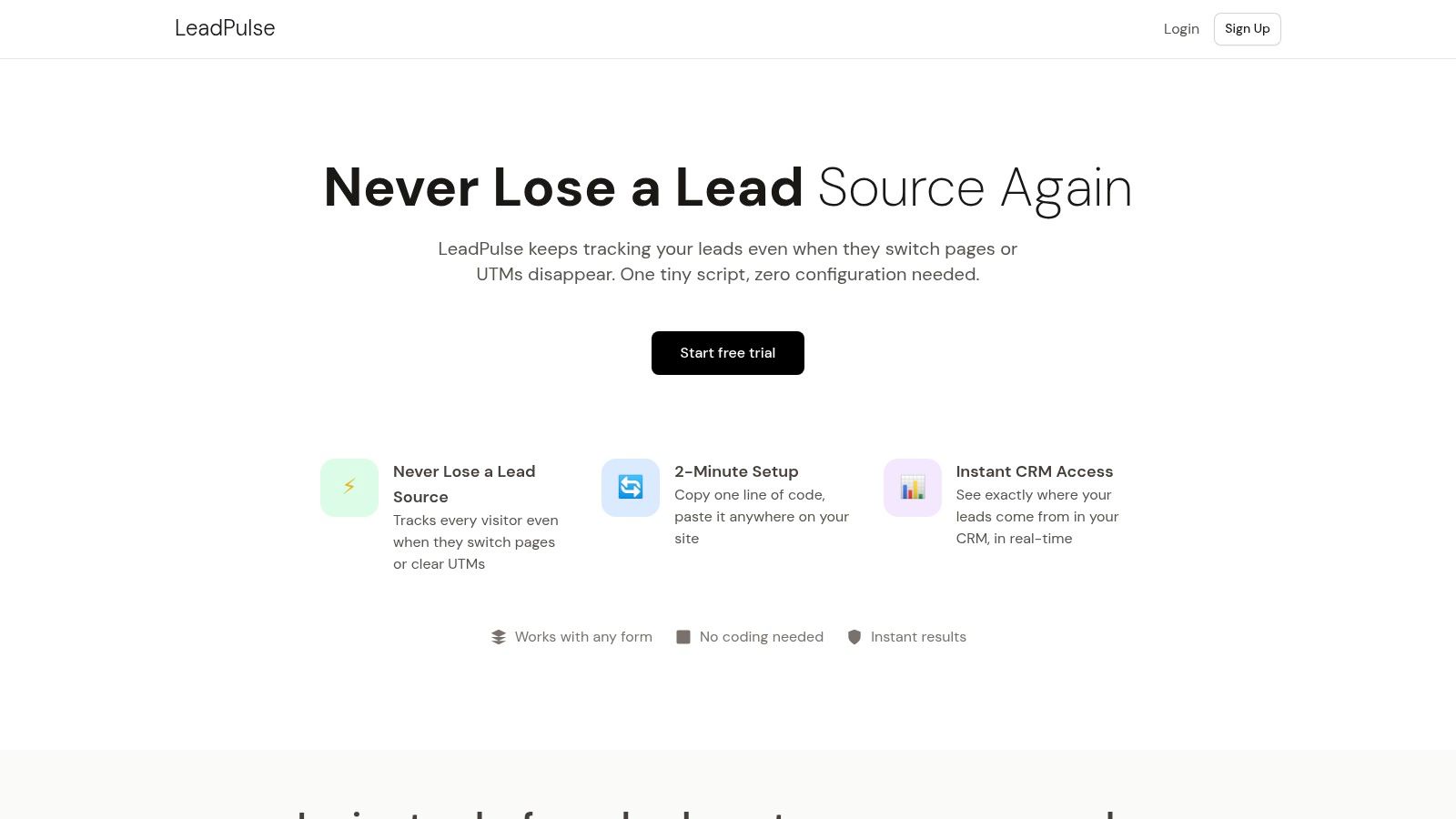
LeadPulse stands out for its ease of use. Implementation takes just two minutes: simply add one small script to your website—no coding or Google Tag Manager expertise required. It seamlessly integrates with popular platforms like Webflow, WordPress, Typeform, and Gravity Forms, further streamlining the setup process. The intuitive dashboard presents key metrics such as top lead sources, campaign performance, and conversion tracking by source, enabling data-driven decisions about your marketing spend. If you’re struggling to connect the dots between your marketing efforts and lead generation, LeadPulse provides the clarity you need without the technical headaches.
For those times when UTM parameters are missing, LeadPulse is developing AI-powered fallback attribution to further enhance accuracy. This upcoming feature will provide even deeper insights into lead sources, helping you optimize your strategy for maximum ROI.
Pricing and Technical Requirements:
LeadPulse offers flexible pricing options to suit various needs and budgets. A free tier caters to those just starting out, allowing tracking for up to 10 leads per month. An Early Bird Lifetime offer provides advanced tracking and priority support for either €29.99/month or a one-time payment of €79.99. A Premium plan is also in the works, promising expanded lead limits and webhook integrations. Currently, LeadPulse supports single domain tracking.
Pros:
- Effortless 2-minute setup with a single script and no coding required.
- Automatic lead source tracking across pages and sessions, even when UTMs are lost.
- Seamless integration with popular CRMs and forms like HubSpot, Salesforce, Airtable, Webflow, Typeform, and more.
- Comprehensive dashboard providing real-time insights into lead sources, campaigns, and conversion rates.
- Affordable pricing plans including a free tier and a lifetime deal option.
Cons:
- AI-powered fallback attribution is still under development, potentially limiting accuracy in some cases for now.
- Current support is limited to single domain tracking.
Why LeadPulse deserves its spot on this list:
LeadPulse effectively bridges the gap between complex attribution data and actionable insights for non-technical users. Its simplicity, affordability, and seamless integrations make it an invaluable tool for anyone looking to understand and optimize their lead generation process. For marketers and business owners who rely on forms and CRMs, and who are frustrated by the limitations of traditional UTM tracking, LeadPulse provides a user-friendly solution to gain a complete view of the customer journey.
Website: https://getleadpulse.com
2. Google Analytics 4
Google Analytics 4 (GA4) is the latest iteration of Google's widely used web analytics platform and a powerful free marketing attribution tool. Unlike its predecessor, Universal Analytics, GA4 offers advanced attribution modeling capabilities, providing a more comprehensive understanding of the customer journey. By leveraging machine learning, GA4 analyzes how different marketing touchpoints, from social media clicks to email campaigns, influence conversions. This allows marketers to allocate budget effectively and optimize campaigns for maximum ROI. It's particularly valuable for businesses running campaigns across multiple channels, providing a holistic view of performance.
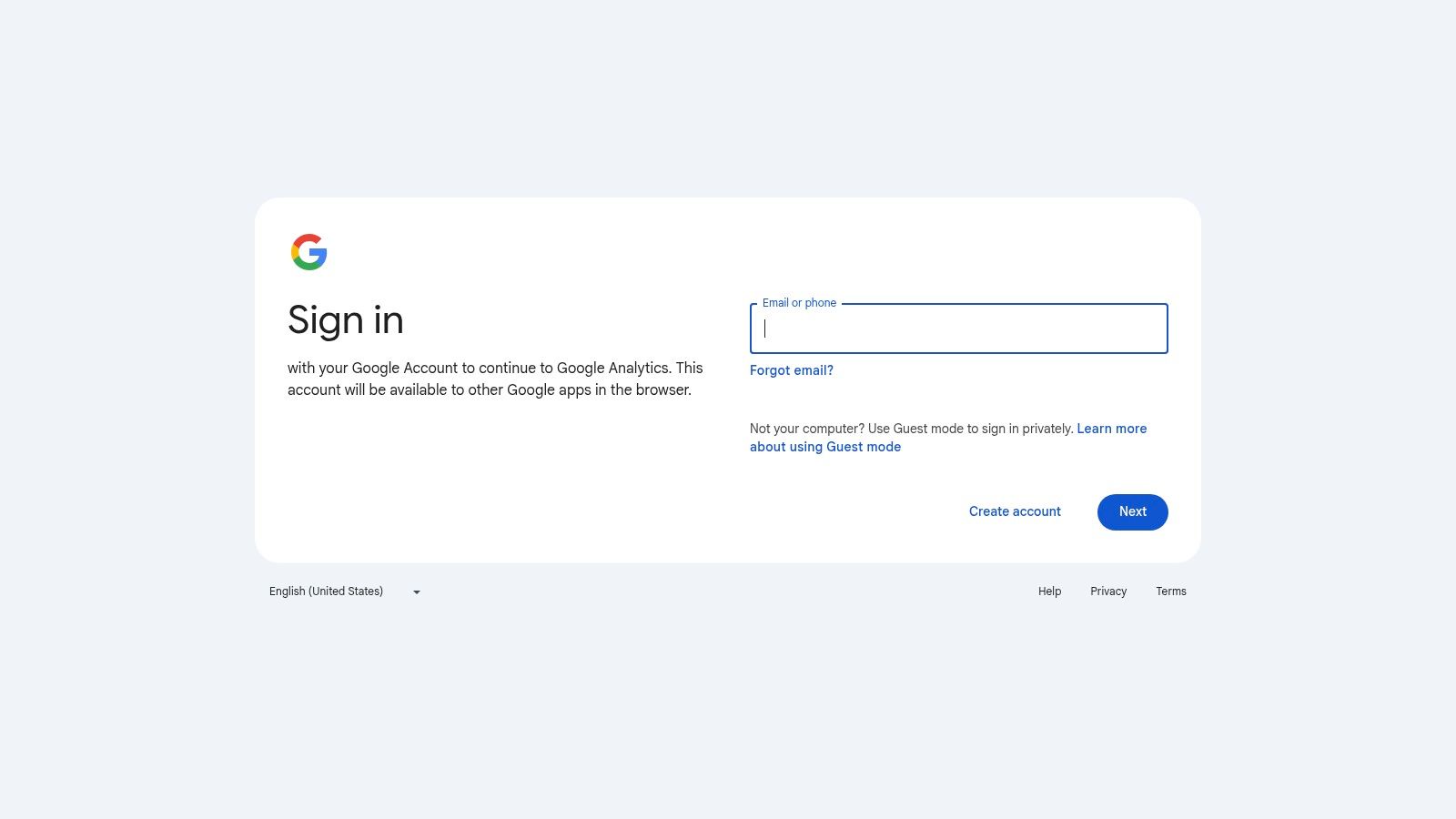
For example, imagine you're running a lead generation campaign with ads on Google, Facebook, and LinkedIn, alongside organic social media posts and email marketing. GA4 can help you understand which of these channels are most effective in driving form submissions or demo requests. Instead of simply crediting the last click, GA4 distributes credit across all touchpoints, revealing the true contribution of each channel. This allows you to see, for example, that while LinkedIn might be driving the final click, your Facebook ads are playing a crucial role in raising awareness and driving initial engagement. This insight empowers you to refine your strategy, perhaps increasing investment in Facebook ads to further boost top-of-funnel activity.
GA4’s seamless integration with other Google marketing products, like Google Ads and the Google Marketing Platform, simplifies reporting and streamlines your workflow. You can view conversion data alongside your ad spend and other key metrics, all within a single platform. This integration is particularly beneficial for businesses already invested in the Google ecosystem.
Key Features for Attribution:
- Data-driven attribution: GA4 uses machine learning to assign credit to each touchpoint in the customer journey, providing a more accurate picture of marketing effectiveness than traditional last-click models.
- Cross-platform tracking: Track user behavior across websites and apps to understand how customers interact with your brand across different devices. This is crucial for businesses with a mobile app presence.
- Customizable attribution windows and lookback periods: Tailor the attribution window to align with your specific sales cycle and customer journey length.
Pros:
- Free tier: Offers robust functionality for most businesses, making sophisticated attribution accessible even on a limited budget.
- Seamless Google integration: Effortless integration with other Google marketing tools simplifies reporting and analysis.
- Machine learning capabilities: Provides advanced insights into customer behavior and attribution.
Cons:
- Learning curve: Can be challenging to learn for users familiar with Universal Analytics, especially for those without a technical background.
- Less flexible than specialized tools: While GA4 offers powerful attribution features, some specialized attribution tools may offer more granular control and customization options.
Implementation Tips:
- Dual tagging with Universal Analytics: If you are currently using Universal Analytics, it's recommended to run GA4 in parallel to collect data and familiarize yourself with the platform before Universal Analytics sunsets.
- Explore the Exploration reports: Leverage GA4's exploration reports to create custom attribution reports and visualize data based on your specific needs.
Pricing and Technical Requirements:
GA4 offers a free tier with generous data limits. For larger enterprises with high data volumes and more advanced needs, Google Analytics 360 provides premium features and increased data processing capabilities at a subscription cost. Implementing GA4 involves adding a tracking code to your website or app, a process that can be handled without extensive technical expertise.
Google Analytics 4 provides valuable attribution insights for marketers seeking to understand the complex customer journey. Its data-driven attribution model, cross-platform tracking, and integration with the Google marketing ecosystem make it a compelling choice for businesses of all sizes. While the learning curve may be steep initially, the long-term benefits of understanding your marketing attribution in GA4 are substantial.
3. Adobe Analytics
Adobe Analytics is a powerful marketing attribution tool, particularly well-suited for large enterprises with complex multi-channel marketing strategies. It offers a comprehensive suite of features to understand the customer journey and assign credit to various touchpoints leading to conversions. This allows marketers to optimize campaigns, allocate budget effectively, and demonstrate the ROI of their marketing efforts. For businesses investing heavily in both online and offline channels, Adobe Analytics provides valuable insights into how these channels interact and influence customer behavior.
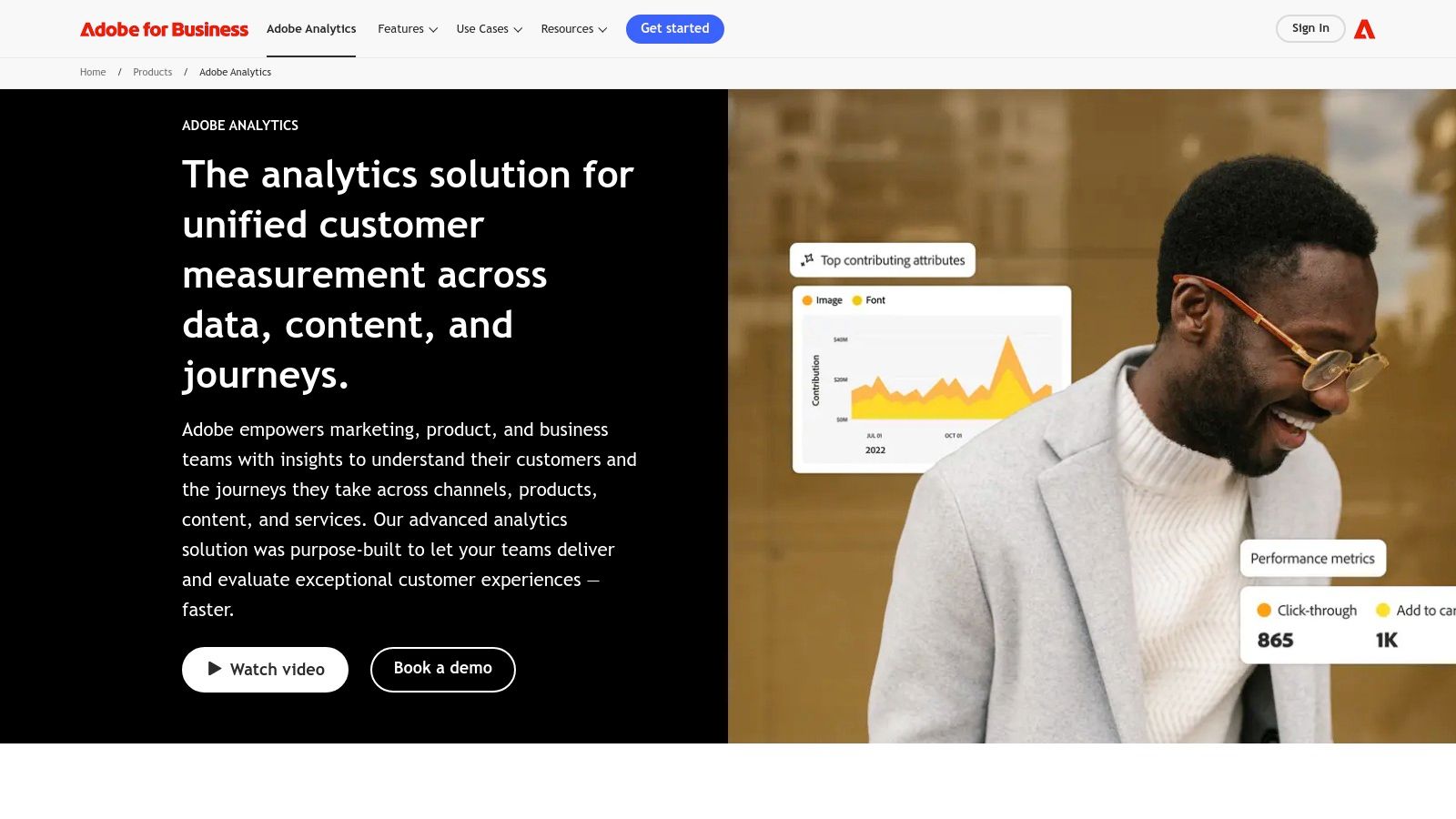
While Adobe Analytics offers granular attribution modeling for large organizations, its complexity and cost might be overwhelming for smaller businesses relying primarily on simpler online forms and CRM integrations. For example, a small business owner using Typeform and HubSpot might find the extensive features of Adobe Analytics unnecessary and difficult to manage. They might be better served by a simpler, more focused attribution tool designed for lead generation through forms.
However, if you are managing intricate campaigns across numerous online and offline touchpoints, Adobe Analytics shines. Imagine launching a campaign involving social media ads, email marketing, direct mail, and in-person events. Adobe Analytics allows you to track each interaction and understand how each touchpoint contributes to the final conversion, whether it's a sale, a lead capture, or another desired outcome. Its Attribution IQ technology uses algorithmic modeling to go beyond basic rule-based attribution, providing a more nuanced and accurate view of the customer journey. You can compare different attribution models side-by-side to see how credit is assigned under different scenarios and choose the model that best aligns with your business objectives.
Features:
- Attribution IQ: Offers various rule-based and algorithmic attribution models.
- Advanced Segmentation: Allows for in-depth analysis of specific customer segments.
- Cross-Channel Attribution: Tracks online and offline touchpoints for a holistic view.
- Custom Attribution Modeling: Enables the creation of tailored attribution models.
- Real-Time Reporting: Provides up-to-the-minute data for quick decision-making.
Pros:
- Comprehensive attribution for complex multi-channel marketing.
- Seamless integration with other Adobe Experience Cloud products.
- Robust visualization and reporting tools.
- Strong capabilities for combining online and offline data.
Cons:
- Significant investment cost.
- Best suited for enterprise-level organizations.
- Complex implementation requiring specialized expertise.
- Steep learning curve for new users.
- Ongoing maintenance and optimization required.
Website: https://business.adobe.com/products/analytics/adobe-analytics.html
Implementation Tips (for Enterprise Users):
- Define clear objectives: Determine what you want to achieve with attribution modeling before implementation.
- Plan your data integration: Ensure all relevant data sources are integrated with Adobe Analytics.
- Start with basic attribution models: Begin with simpler models and gradually move to more complex ones.
- Train your team: Invest in training to ensure your team can effectively use the platform.
- Regularly review and optimize: Continuously monitor your attribution models and adjust as needed.
Adobe Analytics earns its place on this list because it offers unmatched depth and flexibility for enterprise-level attribution. However, its complexity makes it less suitable for smaller businesses looking for simpler solutions for form-based lead generation. Consider your specific needs and resources before choosing this powerful but demanding platform.
4. Mixpanel
Mixpanel is a product analytics platform that shines when it comes to understanding what users do after they arrive on your website or app. While it may not be a dedicated marketing attribution tool like some others, its strength lies in connecting your marketing efforts to specific user actions and providing granular insights into the customer journey within your product. This makes it particularly valuable for SaaS businesses, mobile app developers, and anyone focused on optimizing the user experience to drive conversions. Imagine you're running a campaign to encourage users to sign up for a free trial. Mixpanel can help you pinpoint which campaign elements are most effective in not only driving sign-ups, but also in leading those users to engage with key features and eventually convert to paying customers. It provides a deep dive into the user journey, going beyond just the initial click.
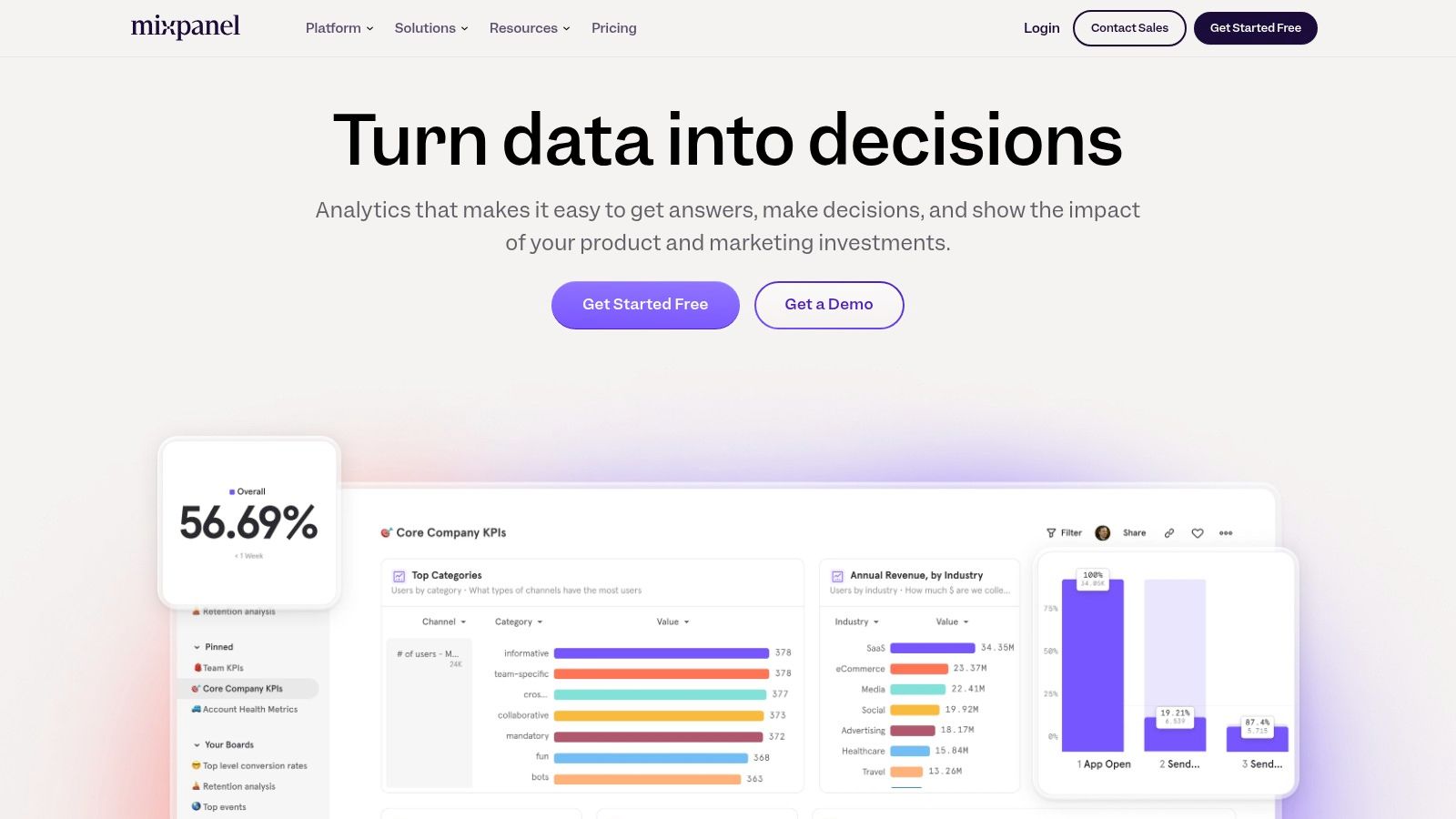
For non-technical marketers, Mixpanel's intuitive interface and visualization tools are a major plus. You can easily track UTM parameters to understand which campaigns are bringing in users and how those users are behaving. Its custom attribution models with adjustable lookback windows give you flexibility in determining how credit is assigned to different touchpoints. For example, you could give more weight to the last click before a conversion or distribute credit across all touchpoints within a specific timeframe. This helps you get a clearer picture of what’s truly influencing your customer's decision-making process.
Key Features for Marketing Attribution:
- UTM Parameter Tracking and Reporting: Understand which campaigns and channels are driving traffic and conversions. This is crucial for understanding where your leads are coming from and optimizing your campaigns accordingly.
- Custom Attribution Models: Tailor attribution models to fit your specific business needs, allowing for more accurate measurement of marketing effectiveness. This allows you to move beyond simple last-click attribution and understand the full customer journey.
- Cohort Analysis: Analyze user behavior over time to understand the long-term impact of your marketing efforts. This is particularly helpful for SaaS businesses and others focused on customer retention.
- User-Level Attribution Data: Drill down into individual user journeys to gain granular insights into how specific users interact with your marketing and product.
- A/B Testing Capabilities: Optimize your marketing campaigns and product experiences through A/B testing, using attribution data to measure the impact of different variations.
Pros:
- User-Friendly Interface: Easy to navigate and understand, even for non-technical users.
- Focus on User Behavior: Get deep insights into how users interact with your product or website after clicking on your marketing campaigns.
- Real-Time Data Processing: Access up-to-the-minute data to quickly identify trends and optimize your campaigns.
Cons:
- Product Analytics Focus: While its attribution capabilities are strong, its primary focus is product analytics, which might be more than some marketers need. If you're solely looking for a marketing attribution tool, other options might be more streamlined.
- Limited Offline Channel Attribution: Not ideal for businesses heavily reliant on offline channels.
- Cost: Pricing is based on event volume, which can get expensive as your user base and data tracking needs grow.
Pricing: Mixpanel offers a free plan with limited functionality, as well as paid plans starting at $25/month. Specific pricing depends on the number of monthly tracked users and the features you require.
Website: https://mixpanel.com/
In short, Mixpanel earns its place on this list by providing powerful user-level insights that connect your marketing efforts directly to product usage and conversions. If you're looking to understand not just where your leads come from, but also what they do after they arrive, Mixpanel is a strong contender. For those focused primarily on form submissions and CRM integration, however, simpler tools might be a better fit.
5. AppsFlyer: Mobile Marketing Attribution Mastered
AppsFlyer is a powerful mobile attribution and analytics platform built specifically for app marketers. If your marketing efforts heavily involve mobile apps, understanding where your installs and in-app actions originate is crucial. AppsFlyer excels at attributing these activities back to specific campaigns and sources like paid ads, social media, and email marketing, giving you a clear view of what's working. This allows you to optimize your campaigns, allocate budget effectively, and ultimately maximize your return on investment (ROI). AppsFlyer also provides robust fraud protection, helps aggregate costs from different platforms, and offers in-depth ROI analysis, creating a comprehensive solution for mobile app marketing attribution. For businesses heavily reliant on mobile apps, AppsFlyer is a top contender in the marketing attribution tools landscape.
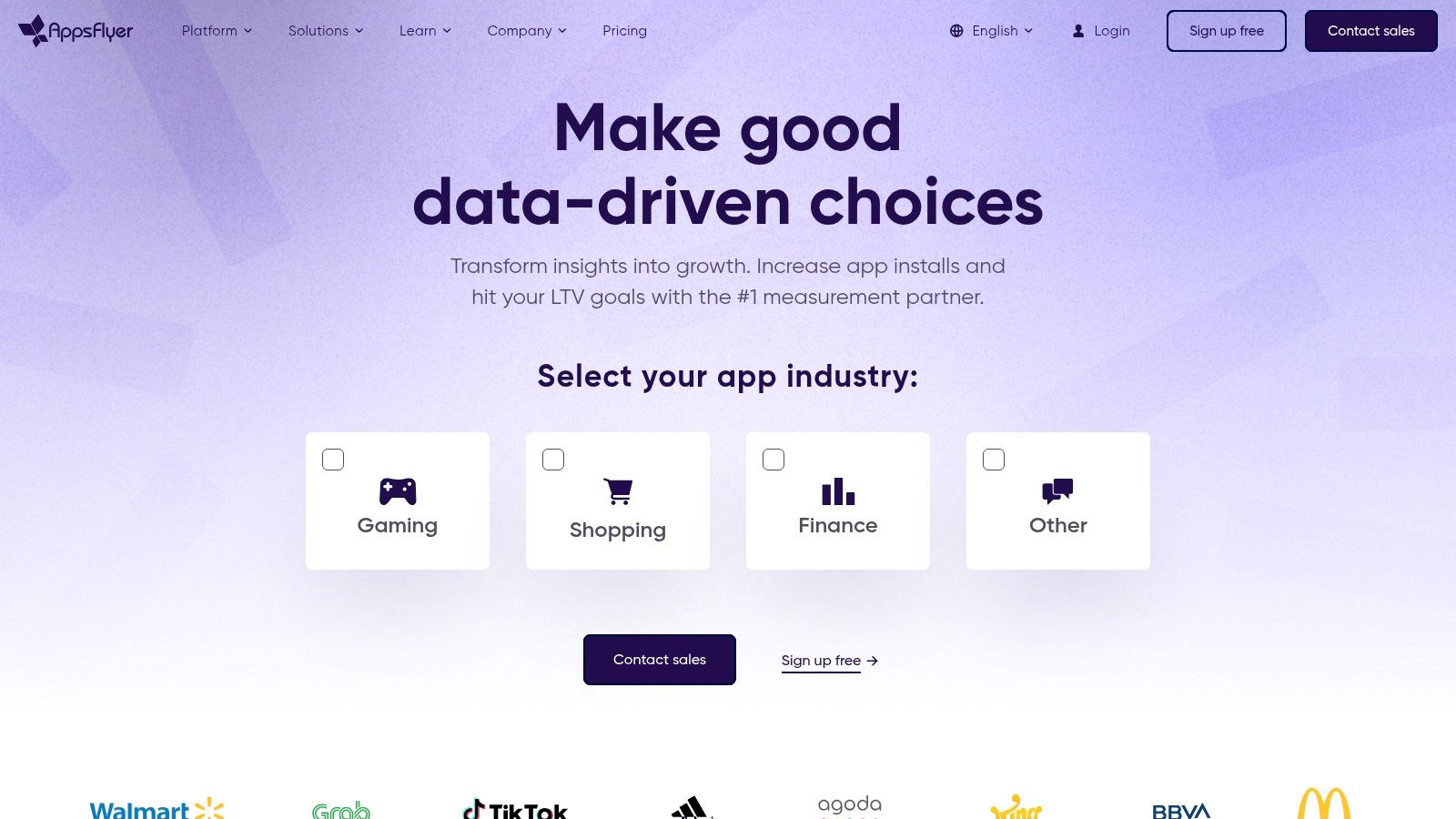
Key Features and Benefits for Mobile-First Businesses:
- Pinpoint Attribution: Track app installs and in-app events (like purchases or registrations) back to their original source, providing granular insights into campaign performance. For example, you can see precisely which Facebook ad campaign is driving the most profitable in-app purchases.
- People-Based Attribution: Connect user activity across multiple devices to get a holistic view of customer behavior. This helps understand the entire customer journey, even if they switch between their phone and tablet.
- Advanced Fraud Prevention (Protect360): Safeguard your marketing budget from fraudulent installs and activities, ensuring you're paying for real users and engagement.
- Deep Linking: Improve user experience and attribution accuracy by directing users to specific in-app content directly from your marketing campaigns. For instance, a user clicking a promotional banner for a specific product can be taken directly to that product page within the app.
- Audience Segmentation and Cohort Analysis: Analyze user behavior based on shared characteristics and track their performance over time. This enables targeted marketing campaigns and personalized user experiences.
Pros:
- Mobile Expertise: AppsFlyer's specialization in mobile app attribution translates to a depth of features and insights unmatched by more general marketing attribution tools.
- Extensive Integrations: Seamlessly integrates with over 8,000 marketing and advertising partners, simplifying data consolidation and campaign management.
- Robust Fraud Protection: The Protect360 system effectively identifies and blocks fraudulent activity, protecting your marketing budget and ensuring accurate data.
- Visualizations and Reporting: Offers user-friendly dashboards and reporting tools to visualize data and derive actionable insights.
Cons:
- Mobile Focus: While its strength, the mobile focus also means AppsFlyer is less suitable for businesses with a significant web presence requiring a more holistic view of attribution across channels.
- Cost: Pricing can be substantial for high-volume apps, potentially making it less accessible for smaller businesses or those with limited budgets. While specific pricing isn't publicly available, it typically involves a tiered structure based on the number of attributions and features required. Contact AppsFlyer directly for detailed pricing information.
- Complex Setup: Fully utilizing all features can require a complex setup process, potentially demanding technical expertise.
Implementation Tips:
- Plan your integration strategy: Map out your existing marketing platforms and advertising partners to ensure seamless integration with AppsFlyer.
- Define key performance indicators (KPIs): Identify the metrics that are most important for your app's success and tailor your AppsFlyer setup to track those KPIs effectively.
- Explore the documentation and support resources: AppsFlyer offers extensive documentation and support to guide you through the implementation process.
Comparison with Similar Tools:
While tools like Branch and Adjust offer similar mobile attribution capabilities, AppsFlyer differentiates itself with its robust fraud prevention system, comprehensive integrations, and advanced analytics features.
Website: https://www.appsflyer.com/
AppsFlyer deserves a place on this list because it provides a specialized and powerful solution for mobile app marketers seeking granular insights into their campaign performance. While the cost and complexity might be a barrier for some, the depth of features and mobile focus makes it an invaluable tool for businesses heavily reliant on app-driven marketing.
6. HubSpot Marketing Hub
HubSpot Marketing Hub is a powerful option for businesses seeking robust marketing attribution tools within a comprehensive marketing automation platform. It allows marketers to analyze how various marketing efforts contribute to revenue, making it easier to optimize campaigns and demonstrate ROI. This makes it particularly valuable for B2B marketers focused on content marketing and inbound strategies who need a clear understanding of their customer journey. HubSpot provides both single-touch (giving all credit to one touchpoint) and multi-touch (distributing credit across multiple touchpoints) attribution models, offering flexibility in analyzing marketing performance. For those already using HubSpot's CRM, the seamless integration offers a complete view of the customer lifecycle from initial contact to closed deal.
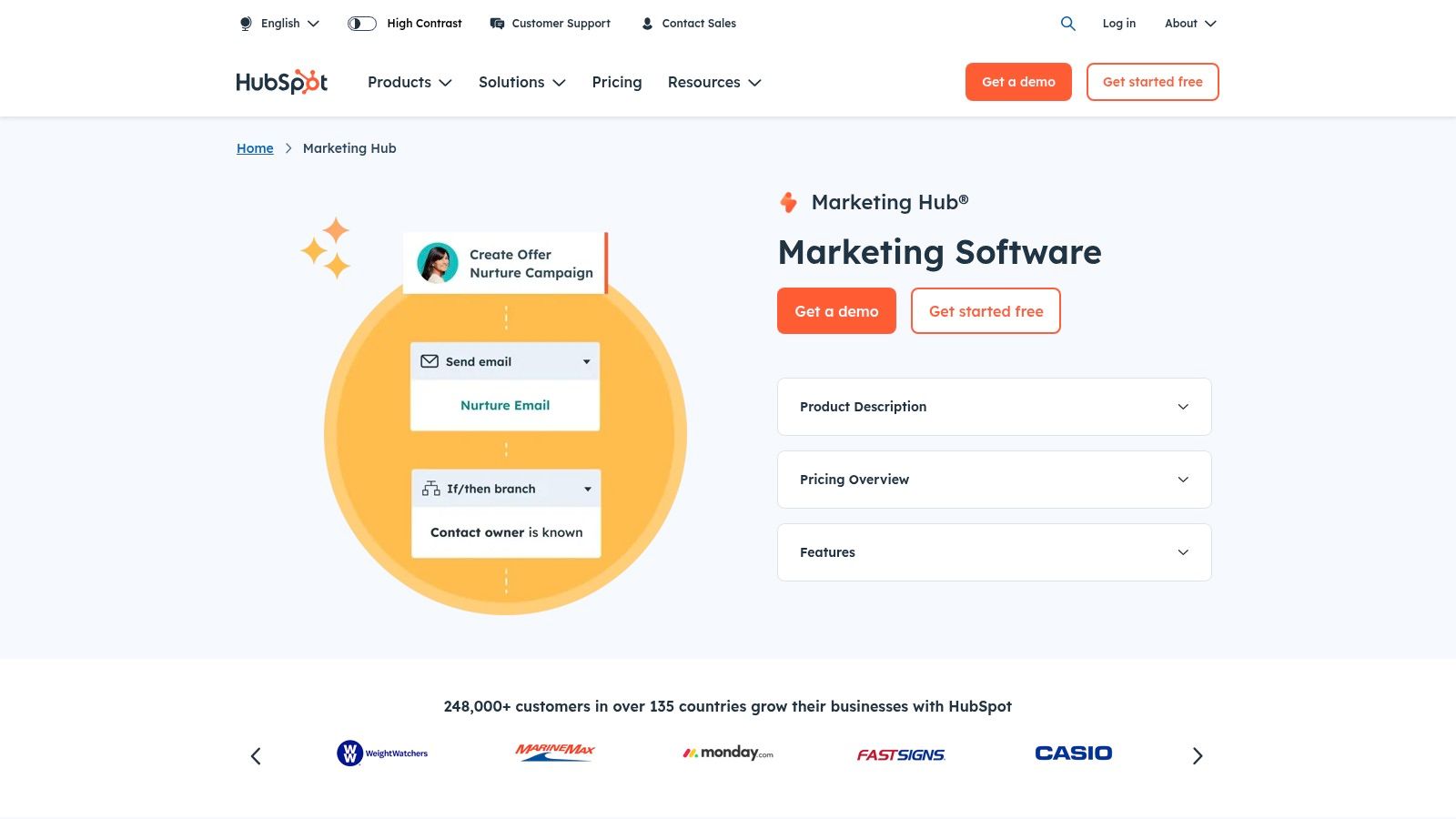
For non-technical marketers or small business owners who are already using HubSpot's CRM for lead capture, the built-in marketing attribution tools offer a straightforward way to connect marketing activities with revenue. Imagine you're running a lead generation campaign with forms on your website, likely built with tools like Webflow or WordPress. HubSpot Marketing Hub lets you see which blog posts, social media campaigns, or email sequences are driving the most valuable leads and ultimately contributing the most to closed deals. This eliminates the guesswork and empowers data-driven decisions about where to focus your marketing resources.
Key Features and Benefits:
- Multi-Touch Revenue Attribution: Understand the combined impact of different marketing touchpoints, like a blog post leading to a downloaded resource, followed by an email nurture sequence that eventually converts the lead.
- Content Attribution: Measure the ROI of specific content pieces, identifying high-performing content that resonates with your audience and contributes to conversions.
- HubSpot CRM Integration: Get a holistic view of the customer journey, connecting marketing efforts directly to sales outcomes and providing closed-loop reporting. This is particularly valuable for those already leveraging HubSpot's CRM.
- Custom Attribution Modeling: Fine-tune your attribution models by adjusting the weight assigned to different touchpoints, allowing you to customize the analysis based on your specific business needs.
- Campaign Reporting with Attribution Insights: Analyze the effectiveness of individual campaigns, including attribution data, to understand which campaigns are driving the best results.
Pros:
- Seamless HubSpot Integration: Effortlessly connects marketing, sales, and service data for a unified view of the customer journey.
- User-Friendly Interface: Designed for non-technical users, minimizing the need for specialized expertise.
- Strong for Inbound Marketing: Excellent for tracking content performance and understanding the impact of inbound strategies.
- All-in-One Solution: Combines marketing automation, CRM, and sales tools in a single platform.
Cons:
- Advanced Features Require Higher Tiers: Access to more sophisticated attribution models and customization options often requires upgrading to a more expensive subscription.
- Less Specialized Than Dedicated Platforms: May lack the granular control and advanced features found in specialized attribution platforms.
- Limited Customization: Offers less customization compared to enterprise-level solutions.
- B2B Focus: While usable for B2C, the platform's features are generally better suited for B2B attribution use cases.
Website: https://www.hubspot.com/products/marketing
Implementation Tips:
- Define Your Attribution Model: Choose the attribution model that best aligns with your business goals and customer journey.
- Integrate with Your CRM: Connect HubSpot Marketing Hub with your CRM to track leads and revenue attribution accurately.
- Customize Your Reporting: Tailor reports to focus on the metrics most important to your business.
- Regularly Review and Adjust: Monitor your attribution data and make adjustments to your marketing strategies based on the insights gained.
HubSpot Marketing Hub earns its place on this list because it offers a user-friendly yet powerful solution for businesses, especially those already within the HubSpot ecosystem, looking to understand the impact of their marketing efforts on revenue. While advanced features come at a higher cost and dedicated platforms might offer more specialized functionality, HubSpot's integrated approach provides a valuable tool for non-technical marketers seeking clear, actionable insights.
7. Amplitude
Amplitude stands out among marketing attribution tools because it dives deeper than just acquisition. It helps you understand how your marketing campaigns influence user behavior after they've signed up, offering critical insights into product adoption, engagement, and retention. This makes it especially valuable for businesses focused on growing and retaining their digital product user base. Instead of simply attributing a conversion to a specific campaign, Amplitude helps you understand which marketing touchpoints contribute to long-term user value. For example, you can see which campaigns bring in users who are most likely to become paying subscribers or engage with key features. This granular level of insight allows for data-driven optimization of your entire marketing funnel, not just the top.
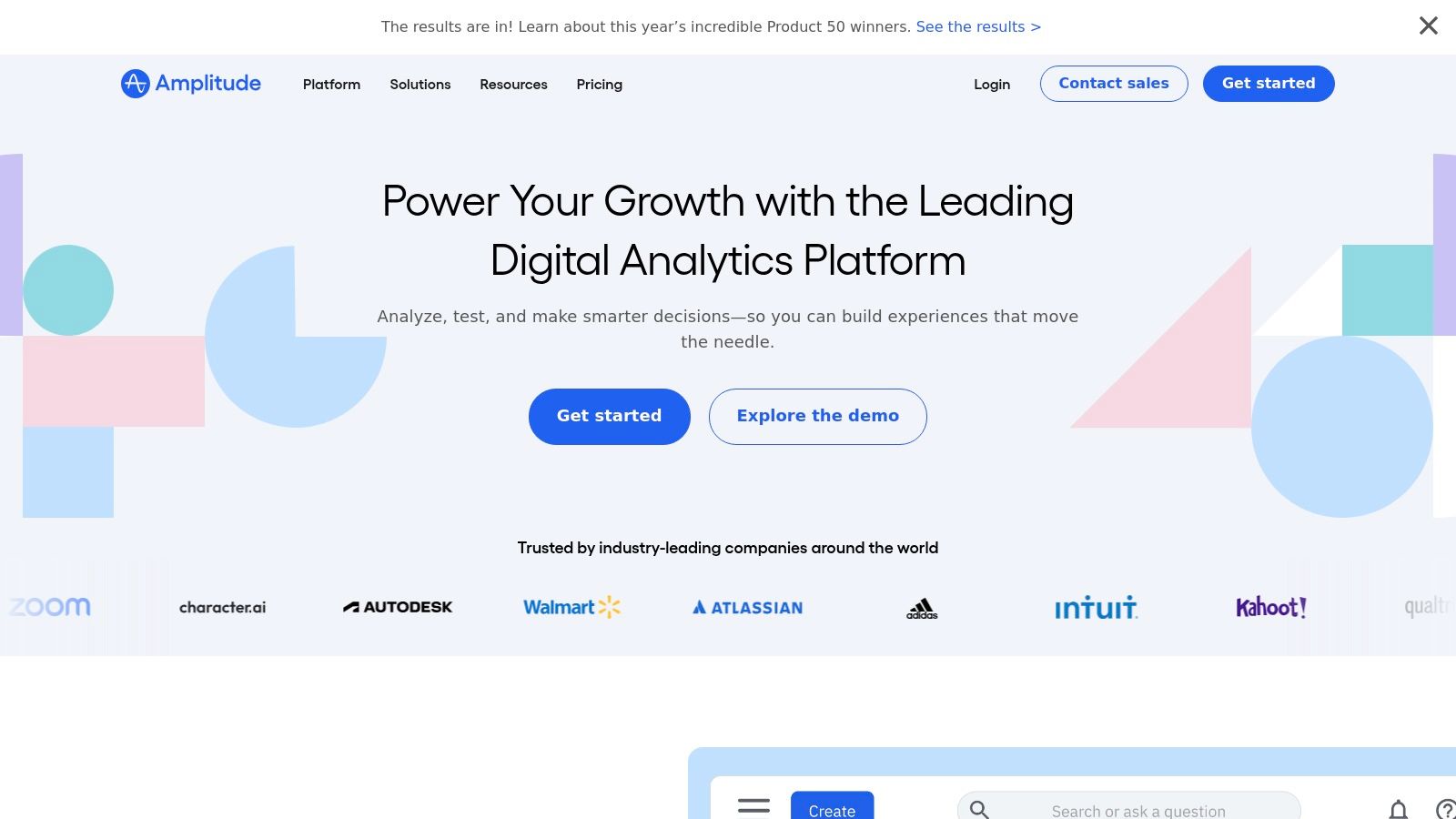
Amplitude achieves this through features like behavioral cohort analysis and multi-touch attribution across the entire user journey. You can analyze which channels drive specific actions within your product, like completing a tutorial or making a purchase. Its campaign and channel performance analytics dashboards provide clear visualizations of the impact of your marketing efforts, going beyond simple click-through rates and conversion numbers. Furthermore, Amplitude integrates with major advertising platforms, pulling in attribution data to give you a holistic view of your marketing performance. You can even create custom attribution models and analyze specific conversion paths tailored to your business needs.
While Amplitude’s advanced features make it a powerful tool for digital product companies, it might not be the best fit for everyone, especially those focused primarily on traditional marketing. The platform’s robust analytics capabilities come with a steeper learning curve compared to simpler attribution tools. While valuable for in-depth analysis, non-technical marketers might find the initial setup and ongoing use somewhat challenging. Additionally, unlocking the full potential of Amplitude, with features like machine learning-powered insights and the ability to process billions of events, often requires an enterprise-level pricing plan. The initial implementation also typically requires some technical expertise to ensure proper integration with your product and data sources.
Key Features & Benefits Recap:
- Deep Dive into Product Usage: Understand how marketing influences not just acquisitions, but also product adoption, engagement, and retention.
- Visualize Customer Journeys: Powerful visualizations make it easy to understand complex customer journeys and pinpoint key touchpoints.
- Multi-Touch Attribution: Attribute conversions based on a combination of marketing touches, providing a more accurate view of campaign effectiveness.
- Behavioral Cohort Analysis: Analyze user behavior based on their acquisition source to identify high-value customer segments.
Pros:
- Unparalleled insights into product usage and retention.
- Strong visualization tools for complex data.
- Machine learning-powered insights.
- Scalable to handle massive datasets.
Cons:
- Primarily focused on digital product analytics.
- Steeper learning curve.
- Premium features require enterprise pricing.
- Setup requires technical resources.
Website: https://amplitude.com/
While Amplitude might not be the ideal solution for a small business owner primarily focused on lead generation through forms and CRM integrations, its powerful analytics capabilities make it a top contender for businesses with a strong focus on digital product growth and a need to understand the full impact of their marketing efforts on user behavior and long-term value. If you’re looking to go beyond basic attribution and truly understand the customer journey within your digital product, Amplitude is worth exploring.
8. Bizible (Marketo Measure)
Bizible, now Marketo Measure after its acquisition by Adobe, stands out among marketing attribution tools for its robust capabilities tailored to B2B marketers. If your business grapples with long, complex sales cycles involving numerous touchpoints across online and offline channels, Marketo Measure offers a powerful solution for understanding the true impact of your marketing efforts. This tool excels at connecting marketing activities to revenue, providing clear insights into what's working and what's not. It helps answer the critical question: which marketing initiatives are actually driving sales?
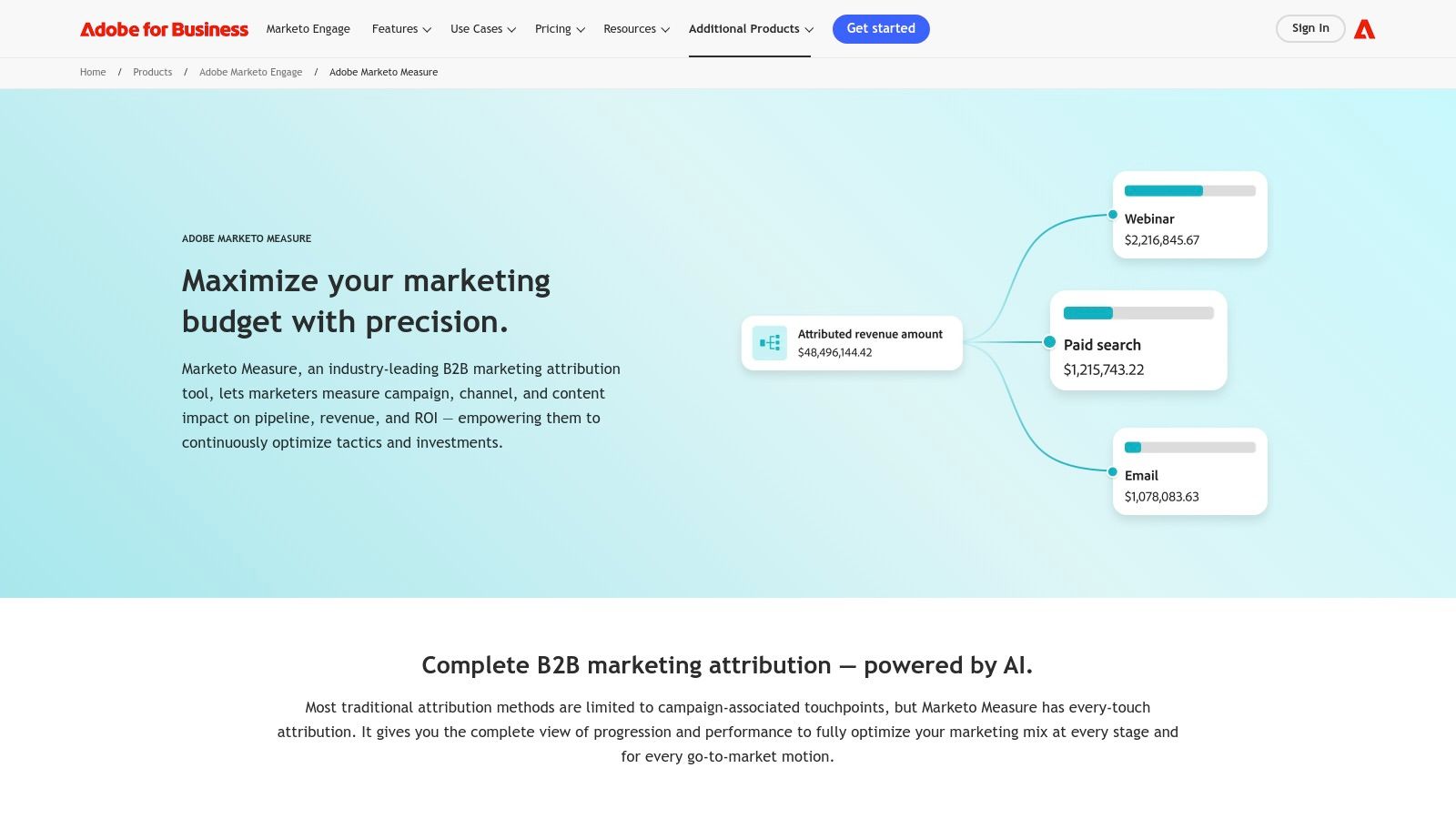
For example, imagine a B2B software company running campaigns across Google Ads, LinkedIn, webinars, and industry events. Marketo Measure can track a lead's journey from their initial interaction with a Google Ad, through downloading a whitepaper, attending a webinar, and finally converting into a paying customer. By analyzing these touchpoints, Marketo Measure assigns credit to each interaction, allowing marketers to understand the relative contribution of each channel and optimize their spending accordingly. This granular level of attribution is particularly valuable for B2B businesses with lengthy sales cycles, where attributing conversions solely to the last touchpoint often overlooks the crucial role of earlier interactions.
Marketo Measure offers a variety of attribution models, from basic first-touch and lead creation models to more sophisticated U-shaped and W-shaped models, as well as the ability to create custom models. This flexibility allows businesses to choose the model that best reflects their unique customer journey. The platform also boasts AI-powered insights through Adobe Sensei, providing predictive analytics to further optimize marketing spend. Furthermore, its deep integration with CRM systems like Salesforce and Microsoft Dynamics ensures seamless data flow and closed-loop reporting.
While Marketo Measure offers powerful features, it's essential to consider its limitations. As an enterprise-level solution, it comes with a significant investment, making it less accessible to smaller businesses or those with limited budgets. Implementation can also be complex, often requiring specialized expertise. Additionally, its primary focus on B2B means it's not ideal for B2C marketers. Finally, unlocking the full value of Marketo Measure often necessitates integration with the broader Adobe/Marketo ecosystem.
Key Features and Benefits:
- Multi-Touch Attribution: Gain a holistic view of the customer journey by analyzing multiple touchpoints.
- Offline & Online Tracking: Connect both digital and offline interactions for comprehensive attribution.
- ABM Attribution: Measure the effectiveness of your account-based marketing initiatives.
- AI-Powered Insights: Leverage Adobe Sensei for predictive analytics and optimization.
- CRM Integrations: Seamlessly integrates with Salesforce and Microsoft Dynamics for closed-loop reporting.
Pros:
- Designed for B2B complexities.
- Handles long, complex sales cycles effectively.
- Comprehensive touchpoint tracking.
- Robust ROI and revenue attribution reporting.
Cons:
- Enterprise-level pricing.
- Complex implementation.
- B2B focused.
- Ideally used within the Adobe/Marketo ecosystem.
Website: https://business.adobe.com/products/marketo/bizible.html
While Marketo Measure may not be the right fit for every business, particularly smaller businesses or those with a simpler sales process, it earns its place on this list due to its specialized focus on solving complex B2B attribution challenges. Its comprehensive tracking, sophisticated models, and deep CRM integrations make it a powerful tool for B2B marketers seeking to understand the true ROI of their marketing investments.
Marketing Attribution Tools Feature Comparison
| Product | Core Features / Attribution Model | User Experience / Quality ★ | Value Proposition / Pricing 💰 | Target Audience 👥 | Unique Selling Points ✨ |
|---|---|---|---|---|---|
| LeadPulse 🏆 | Multi-channel lead source tracking beyond UTMs, CRM integration | ★★★★★ Simple 2-min setup, intuitive dashboard | Free tier, Early Bird €29.99/mo or €79.99 one-time | Small businesses, agencies, marketers | Zero coding, preserves UTM across sessions, CRM sync |
| Google Analytics 4 | Data-driven, cross-platform attribution & machine learning | ★★★★ Free powerful tool, steep learning curve | Free with paid GA360 upgrade | All business sizes & digital marketers | Google ecosystem integration, ML-driven insights |
| Adobe Analytics | Algorithmic & rule-based models, cross-channel (online/offline) | ★★★★★ Enterprise-grade, complex setup | Enterprise pricing, high investment | Large enterprises | Offline & online integration, advanced visualization |
| Mixpanel | UTM tracking, cohort analysis, event-based marketing analytics | ★★★★ User-friendly, real-time data | Tiered pricing, can be costly at scale | Product teams, mid to large firms | Deep user behavior insights, A/B testing |
| AppsFlyer | Mobile app installs, fraud prevention, multi-device attribution | ★★★★ Mobile-focused, robust fraud detection | Premium pricing, costly for high volume | Mobile app marketers | Mobile attribution specialist, fraud prevention |
| HubSpot Marketing Hub | Multi-touch revenue attribution, content & campaign reporting | ★★★★ Seamless CRM integration, inbound marketing focus | Paid tiers, more features with higher plans | B2B marketers, inbound marketing | HubSpot CRM integration, content attribution |
| Amplitude | Behavioral cohorts, multi-touch, product usage analytics | ★★★★ Deep product insights, steep learning curve | Enterprise pricing, tech setup needed | Digital product companies | Product adoption & retention focus, ML-powered touchpoints |
| Bizible (Marketo) | Multi-touch, ABM attribution, offline & online tracking | ★★★★ Complex setup, B2B focused | Enterprise pricing | B2B Marketers, long sales cycles | B2B multi-touch, Salesforce/MS Dynamics integrated |
Choosing the Right Marketing Attribution Tool for Your Needs
Finding the right marketing attribution tool can feel overwhelming with so many options available. This list has highlighted a range of tools, from simpler solutions like LeadPulse to more complex platforms like Adobe Analytics and Google Analytics 4. Remember, the best tool for you depends on your specific needs and goals. Consider factors like your budget, technical expertise (or lack thereof!), the marketing channels you're using (SEO, paid ads, social media), and how complex your customer journey is. For many businesses, particularly those focused on lead generation through forms and CRMs, a simple, no-code solution can often be the most effective.
Key takeaways to keep in mind as you evaluate marketing attribution tools: ease of use, integration with existing tools like your CRM and form builders, accurate tracking capabilities, and reporting features that provide actionable insights. Implementing the right marketing attribution tool is a crucial step towards understanding your customer journey and optimizing your marketing spend for maximum ROI in 2025 and beyond.
Ready to simplify your marketing attribution and finally see which touchpoints are driving conversions, without the technical headaches? Explore LeadPulse, a tool specifically designed for non-technical marketers who need clear attribution data from forms and CRMs. LeadPulse offers seamless integration with popular platforms and a "set it and forget it" approach to tracking, allowing you to focus on what matters most: growing your business.